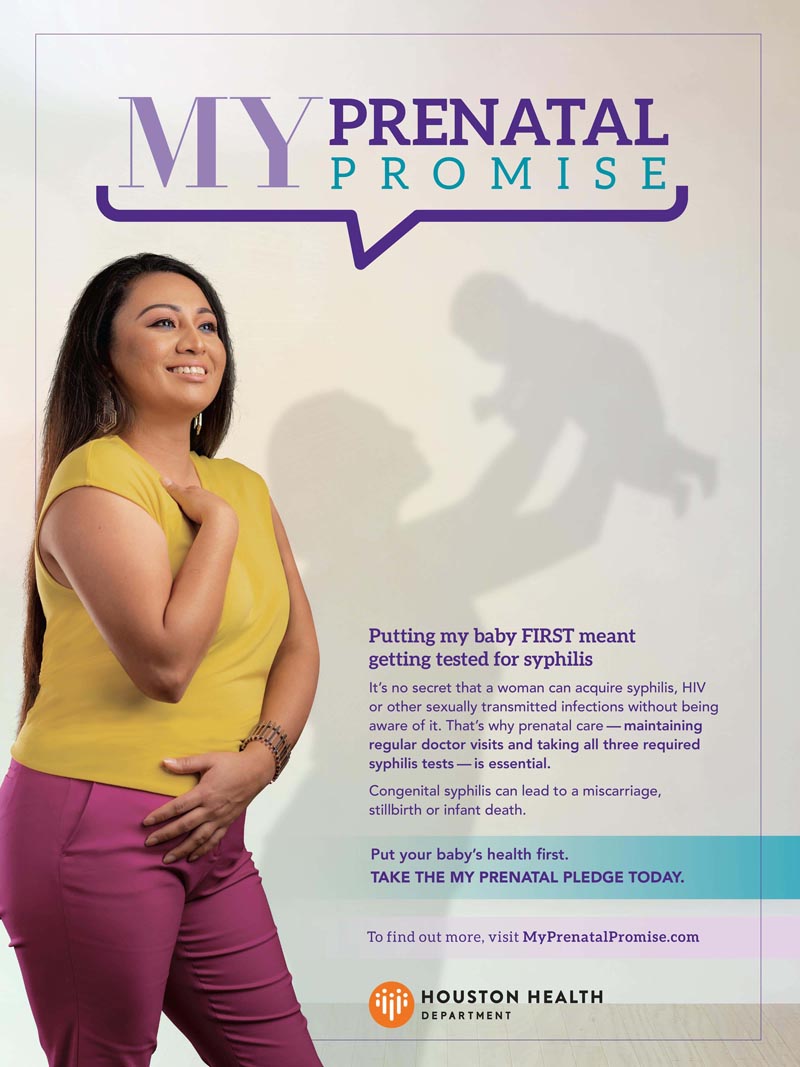Syphilis
My Prenatal Promise
“Expectant Mom” PSA
What is Syphilis?

Syphilis is a bacterial, sexually transmitted infection (STI) that progresses in stages. The disease is curable and progression of the disease is preventable, but if left untreated it can cause cardiovascular and neurological diseases and blindness. Syphilis causes genital ulcers, which increase the likelihood of sexual HIV transmission two- to five-fold.
Untreated, syphilis can be transmitted from a pregnant woman to her fetus.
How is Syphilis Spread?
Syphilis is passed from person to person through direct contact with a syphilis sore or lesion. These occur mainly on the external genitals, vagina, anus, or in the rectum. Sores also can occur on the lips and in the mouth. Transmission of the organism occurs during vaginal, anal or oral sex. Pregnant women with the disease can pass it to the babies they are carrying. Syphilis cannot be spread by toilet seats, door knobs, swimming pools, hot tubs, bath tubs, shared clothing, or eating utensils.
Syphilis in Women
Women with untreated or inadequately treated primary and secondary syphilis (symptomatic syphilis) during pregnancy are more likely to result in clinical congenital syphilis cases. Women with untreated or inadequately treated non-primary, non-secondary syphilis (early and unknown duration or late syphilis that occurs within one or more years after infection) still have a 23 percent chance of an adverse pregnancy outcome.
In 2018, Texas reported 421 primary and secondary syphilis among women at a rate of 2.9 per 100,000 females. This represents a 38% increase relative to 2017, when 304 cases were reported at a rate of 2.1 cases per 100,000 females. Increased rates of syphilis in women has been associated with increased rates of congenital syphilis regardless of pregnancy status.*
* Bowen, V., Su, J., Torrone, E., Kidd, S., & Weinstock, H. (2015). Increase in Incidence of Congenital Syphilis — United States, 2012–2014. MMWR. Morbidity and Mortality Weekly Report,64(44), 1241-1245.doi:10.15585/ mmwr.mm6444a3 [ref.]
How is Syphilis Diagnosed?
A health care provider can diagnose syphilis by using dark-field microscopy to examine material from syphilis sores. If syphilis bacteria are present in the sore, they will show up with a characteristic appearance.
A blood test is another way to determine whether someone has syphilis. Shortly after infection occurs, the body produces syphilis antibodies that can be detected by an accurate and inexpensive blood test. A low level of antibodies will stay in the blood for months or years, even after the disease has been successfully treated. Because untreated syphilis in a pregnant woman can infect and possibly kill her developing baby, every pregnant woman should have a blood test for syphilis.
Doctors are required to test expectant moms:
- During their first prenatal visit
- During the third trimester no earlier than 28 weeks gestation
- At delivery






